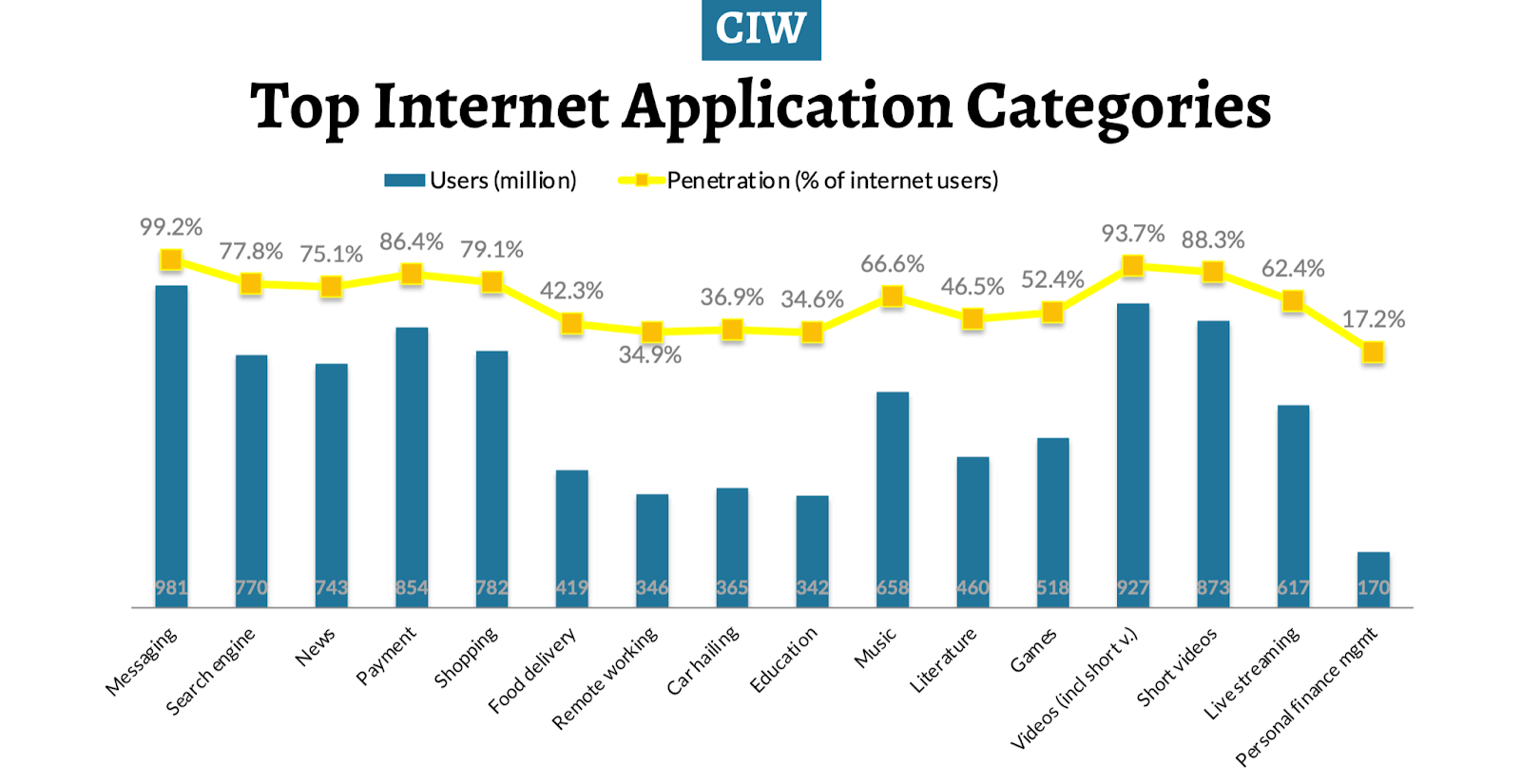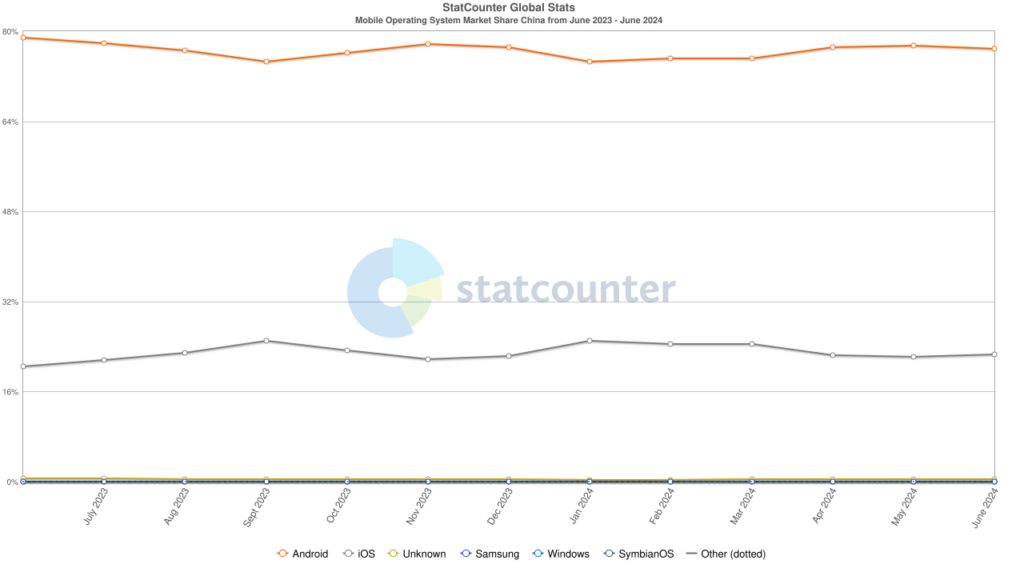China mobile apps 2024: An overview of the Chinese mobile ecosystem today
The market for mobile apps in China is massive, thanks to the country’s huge population. But testing the waters in the China mobile app ecosystem is not easy. Innovation is quick, competition is high, and new rules released over the past few years state that apps have to comply with updated data security, privacy, and data transmission policies. Specifically, the updated 2022 provisions state that app makers must implement real-name authentication and create content review measures.
But there is still massive opportunity.
If you’re a mobile developer in the west, China can feel like almost literally a different world. Its size is unique with 1.09 billion internet users out of a population of 1.4 billion. Plus, China’s digital advertising market is massive: it should exceed $150 billion this year, and grew 15.5% in 2023. By some reports China accounts for 40% of mobile app spending and e-commerce will hit $3.3 trillion USD in 2025.
But the country’s isolation is also unique: the great firewall of China has very specific requirements for the apps and services that it allows in, and much of the outside tech world cannot enter.
But some can.
As a top-10 country in terms of smartphone penetration with little of North America’s and Europe’s legacy of desktop/laptop computing, almost all of China’s digital market and internet penetration is mobile. And that means that anyone looking to enter this market needs to carefully take stock: what works in China? And … how can you successfully enter the market?
What’s hot now: Chinese apps and games
A quick look at the top 10 apps right now in China highlights some of the key differences.
While the U.S. and European charts have relatively familiar names like WhatsApp, TikTok, Instagram, Threads, Google Maps, Snapchat, Gmail, and YouTube, the Chinese market looks very different.

Source: Data.ai (owned by SensorTower)
China Mobile, UCWeb, Tencent, NetEase, IQIYI, and AliPay are familiar names in the top grossing apps. Apps from ByteDance and the Ministry of Public Security are on the most-downloaded list. The ever-familiar QQ and WeChat show up as well.
The hottest categories are Messaging and Videos, according to China Internet Watch.

Almost every single person who has a smartphone in China uses messaging apps, which have a combined 99.2% penetration. Videos on China-equivalent versions of YouTube and Netflix have almost 94% penetration, and payment apps — almost essential for everyday life in a Chinese city — have an also massive 86.4% usage rate.
(Payment apps are so essential the New York Times has said “don’t even try paying cash” in China.)
Mobile is such a key part of life that virtually everyone needs a set of apps just to navigate everyday life. Helpfully, The Helpful Panda shares a list of the key ones, along with their Western equivalents.
| Chinese app | Rough western equivalent |
| WhatsApp + Facebook + much more | |
| Baidu | |
| Sina Weibo | |
| DouYu | Twitch |
| Keep | Fitbit |
| Tencent Video | YouTube |
| Taobao | Amazon + eBay |
| iQIYI | Netflix |
| Alipay | PayPal |
| Didi | Uber, Lyft |
A majority of digital searches in China happen on Baidu, China’s Google. And like Google, Baidu is working on self-driving cars and generative AI via large language models.
WeChat of course, stands on its own. The uber-app is owned by Tencent, and if there were just 1 app in China that you needed to have, WeChat would be it. WeChat famously invented mini-apps which load virtually instantly and do everything from payments to small games to food delivery shopping to social networking. As of March 2024, the platform now has 1.35 billion users. Launched in 2017, WeChat’s mini app count reached over 500,000 with over 170 million daily active users within just a year.
Now WeChat’s mini apps manage an incredible 1.1 billion transactions every day for over 440 million people, and in March 2023 China’s new digital Yuan, the e-CNY, became a payment option on the platform. (You can also link foreign credit cards so that you can use WeChat to transact in China.)
That’s critical, because as Reuters says, “foreign visitors often find themselves unable to pay for things in China where many shops and restaurants now only accept mobile payment rather than credit cards or cash.”
There’s so much you can do inside WeChat that some of its users spend more than 4 hours a day inside the WeChat ecosystem, transacting all the business they need to do, ordering all the products they need, managing whatever services they consume, and communicating with whoever they need to. For 2023’s Chinese New Year, users sent over 4 billion “red envelopes” with small gifts to each other.
On average, WeChat users engage with about 10 mini apps regularly.
That doesn’t mean Chinese app users don’t need additional apps, or that they don’t download full-size apps. It does mean that if your service only requires something small and lightweight, you should look at a WeChat app as an option.
Clearly, however, if you’re making a full-on gaming environment, Chinese mobile users are interested. 5 of the top 10 grossing apps in China so far in 2024 are games, including Dungeons & Fighter Mobile by NEXON as well as Honor of Kings, a multiplayer online battle arena game published by Tencent.
PUBG, Overwatch, Gardenscapes, Clash Royale, and Clash of Clans are examples of western games that have made it in China, so it’s definitely possible.
Apps in China: it’s a different world
But entering the Chinese app market may not be easy. (Correction: it definitely won’t be.)
Everything is different in China. Cloud services that you might want to use in your app are likely not available, forcing you to search for alternatives. The top provider is AliCloud, but there is also Tencent cloud, Huawei cloud, and other competitors. Authentication schemes you typically use via social login are different, and the ones you’re used to might not be available inside China. China does have social login authentications available for most platforms and apps, using local authenticators, although rarely for important apps in fintech, or government apps.
Also, there’s permissions.
Planning to let people log in via WeChat? It’s pretty critical, as it’s the one app most Chinese people can be counted on having. But you’ll need permission, and you need to be Chinese to get that permission. Most of the independent Android app stores — nope, there’s no Google Play in China, unless you’re VPN’ing in — have their own app listing and permissioning processes.
To get traction in China you’ll need no fewer than six separate licenses and permits, and you must host in China and operate with a Chinese-owned entity. You also have to manage user data in accordance with Chinese law and work with the right Chinese partners.
Payment providers are also different.
Out goes PayPal, in goes WeChat Pay or Alipay.
Oh, and if that’s not enough, app standards and usage differ too. Developers looking to bring their apps into China will want to take into account vastly different look and feel standards, says Minds Studios. That includes an acceptance of a busier look, anime-like characters, and toylike design … even for “business” or professional apps.

Source: Mind Studios
That acceptance of a busy look also means acceptance of complexity. Which makes sense: putting a million mini apps into WeChat makes it pretty full.
Chinese apps tend to pack a lot in, says Irene Yang:
“A common theme to must-have Chinese apps is they are a little like an onion, multi-layered. Rather than expecting consumers to hop between one app to research, another to look for reviews and then a final app to make a purchase, Chinese consumers expect to be able to do everything in one place.”
– Irene Yang, regional general manager, Asia & Europe, at Mobvista
Your app may work just fine in China as is. But more than likely, you’ll need some user interface and user experience surgery to get it just right.
Android vs iOS in China … and all the app stores
Android is clearly the leading platform in China, of course.
As of July 2024, almost 76.9% of smartphones in the country are Android-based, while just 22.7% are on Apple’s iOS. But an iPhone is still a status symbol, and iOS has the distinction of being the platform with a much simpler app distribution model: the iOS App Store.

Source: StatCounter
Android, of course, is much different. Since the Chinese government has blocked Google services from the Chinese market, Google Play is unavailable except via VPN. That means Chinese consumers have a vast array of app download options.
The top app stores for Android in China are from familiar names according to AppInChina’s app store index. The top publishers and top hardware manufacturers who offer the biggest and most popular Android app markets in China are led by Huawei, Oppo, VIVO, and Tencent:
| App store | Monthly active users |
| Huawei App Market | 422 million |
| Oppo Software Store | 187 million |
| VIVO App Store | 164 million |
| Tencent My App | 156 million |
| MIUI App Store | 98 million |
| Baidu Mobile Assistant | 69 million |
| 360 Mobile Assistant | 66 million |
| Samsung App Store | 53 million |
| Wandoujia | 13 million |
| PP Assistant | 8 million |
After the big names, popularity on the hundreds of other app stores in China tails off quickly, and with good reason. The bigger stores from the major brands are much more likely to vet apps on their markets much closely in an attempt to weed out malware.
App store fees range significantly, by the way.
Everyone takes a cut, says SAMPi:
“QQ, for instance, takes up to 70% of an app’s revenue while China Unicom takes 30%. In addition, each store has its own guidelines and procedures as well as its own government tax and banking rates. Note that government tax and various regulation fees can easily reach up to 30% on top of the app store cut!
– SAMPi
Again, the top app stores are likely to have fairly reasonable policies: pick based on the audience you need and the coverage you want.
Localizing your app to China
While it’s a tempting fantasy, no one just comes into China, drops their app into the top app markets, and sits back to collect the cash. Apps require much more extensive localization to China than most other international markets. It starts with language, sure, but it includes picking a Chinese name for your app.
You’ll also need to create Chinese content for your Chinese app, which could mean a significant amount of work for characters and storylines in games, or other content in different genres.
Pricing may not seem like a thing that requires localization, except for wealthier or poorer countries, but once again, China is different, Tenba Group explains. Numerology and the cultural significance of different numbers is critical:
“The trick is to use “good” numbers for everything related to values, for example, prices. This may sound trivial to Western consumers but is of the highest importance to Chinese users.
For example, eight is very good, as in Chinese it is pronounced ba (八), which sounds like the fa (发) in “to become rich” ( 发财). On the other hand, you should avoid four, which is si (四). This sounds similar to si ( 死), meaning death. This is why in Chinese buildings, there is often no 4th floor.”
– Valentina Biciuc, Tenba Group
Using QR codes, which Chinese mobile users are accustomed to, and adopting WeChat functionalities in your app will also make Chinese smartphone owners feel at home in your app.
Your marketing needs to be localized too, not just in terms of look and messaging but in terms of where you advertise. Picking the major Chinese social networks — and working with some local influencers who have a huge impact on how their followers perceive your brand — can be incredibly helpful.
Note: in China, it matters what type of app and content you have. Gambling and porn apps are banned by law, making them non-starters to take into the country.
Working with the government: bringing your app to China
If you’re going to bring your app to China, you’re going to need to work with the government. And you’ll need to do that via a local partner with boots on the ground and Chinese citizenship and ownership.
Be aware that China is taking an increasingly close look at the role of the tech industry in the country, and the competitive positions of each company.
For instance, China fined home-grown tech giant Alibaba a record-breaking $2.8 billion for abusing its monopoly position. Chinese regulators are also looking at smaller companies, fining English-language food delivery app Sherpa $180,000 for having a monopoly position: winning “99.8% [of the] daily orders in the English-language food delivery market in the first ten months in 2019,” according to Technode.
So: expect to be working with the government.
Expect it to take longer than you think it should.
And, expect to have to follow regulations and guidelines, some of which may not be written down.
Apps in China: good news about measurement
One piece of good news for those bringing their apps into China: your mobile marketing measurement doesn’t need to change, as Singular offers mobile attribution services in China along with virtually everywhere else on the planet.
That means:
- China-based servers
- China-based data processing (required by Chinese cybersecurity law)
- Integrations with local Chinese networks and media partners
- Integrations with third-party Android app markets
- Fraud protection
Global customers who are looking to add China to the markets they publish in should chat with their Singular representative. We have local people in China who can help you navigate some of the challenges of entering the market.
Perhaps even more importantly, Singular can ensure that all of your marketing efforts get the measurement that they deserve, enabling best-in-class growth optimization in China.
Stay up to date on the latest happenings in digital marketing


